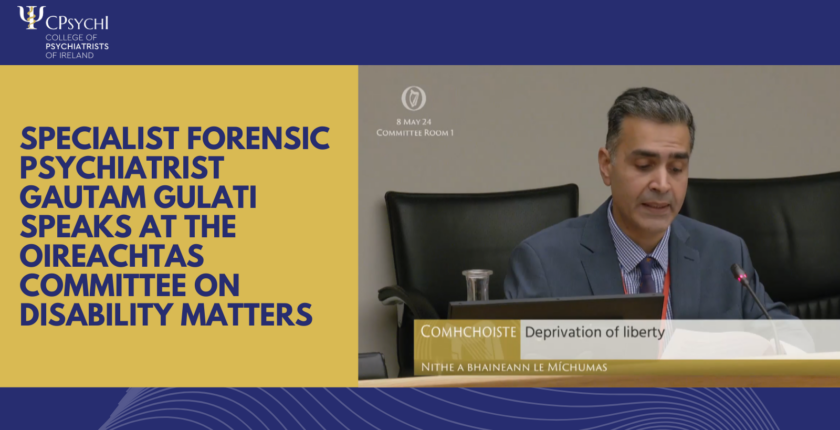Blog
Specialist Forensic Psychiatrist Gautam Gulati Speaks at the Oireachtas Committee on Disability Matters
- May 13, 2024
- Posted by: Harry Kearns
- Category: Blog

College member and Specialist Forensic Psychiatrist Gautam Gulati Spoke at the Oireachtas Committee on Disability Matters on 8th May. Dr Gulati is Consultant Forensic Psychiatrist at Cork and Adjunct Clinical Full Professor at the University of Limerick.
He was invited to speak on the subject of Deprivation of Liberty. He had previously presented to this Committee in July 2021. Last week he updated the committee about people with intellectual and psychosocial disabilities in prisons. Watch a video of the presentation here (Dr Gulati’s contribution starts at 7 minutes), or read his full statement here.
Prof Gulati explained that there are over a 1000 more people in Irish prisons today than 7 years ago. Many prisoners screen positive for intellectual disabilities and the prevalence of severe mental illness is 4 times that of the general population. About 17% of those committed are homeless.
In his clinical experience, he said 1 in 10 prisoners now require secondary or tertiary mental healthcare. In his practice, he regularly come across people with dementia, brain injury, developmental disability and severe mental illness. This includes people with life threatening conditions such as catatonia. It is routine to see people who have attempted suicide in police custody or prison cells.
Prison is the end point of a criminal justice pathway that begins with policing. He explained that the answer to reducing this disproportionate representation lies partly at the policing stage.
However, there remains a need for procedural accommodations in the policing process and on-the-ground support for police to facilitate community alternatives. To be clear this does not, in the vast majority of cases, mean diversion under mental health legislation.
A starting point would be to ensure that procedural accommodations are afforded to accused persons consistently and meaningfully. These include procedures for effective recognition of disability, an accessible notice of rights, effective legal representation, support with communication and access to trained medical expertise.
He highlighted a number of other key points:
- A person with a significant developmental disability, dementia or acute psychosis would have their disability recognised if these safeguards are consistently applied prior to their first court appearance.
- There needs to be more support for our frontline Garda colleagues in respect of access to social work or medical expertise.
- Equivalence of care simply does not exist in Irish prisons. For example, there is little access to expertise in
autism, intellectual disabilities, dementia or community social work in reach.
Prof Gulati concluded by saying that there are interventions earlier in the pathway that may prove to be a point of greatest impact
to address disproportionate incarceration on the basis of disability and social disparity.
